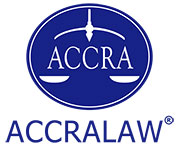
ACCRALAW Tower, 2nd Ave. Cor. 30th St., Bonifacio Global City
Taguig City, Metro Manila, Philippines
Tel: (632) 830-8000, / Fax (632) 4037007 or (632) 4037008
E: dssabilala@accralaw.com W: www.accralaw.com
 The Philippines Stock Exchange (PSE) issued rules on December 2, 2016 governing the listing, trading and settlement of US dollar-denominated securities (DDS).
The Philippines Stock Exchange (PSE) issued rules on December 2, 2016 governing the listing, trading and settlement of US dollar-denominated securities (DDS).
The Rules on Dollar Denominated Securities (DDS Rules) were earlier approved by the Securities and Exchange Commission (SEC) on November 10, 2016 and aim to provide issuers and investors with more instruments to meet their specific requirements. It can provide issuers with dollar-denominated funding requirements and the opportunity to raise capital at the PSE without incurring any foreign exchange risks. In the same manner, the product can also reduce the foreign currency risk exposure of foreign investors who trade PSE-listed securities. In addition, the DDS offers local investors an alternative investment option for their dollar holdings.
The DDS Rules shall apply only to existing listed companies that will issue DDS. DDS listings through initial public offering shall be subject to such other rules, regulations and other guideline as may be prescribed by the PSE and approved by the SEC and other regulatory agencies. The general procedures for the listing of equity securities shall apply in processing listing applications for DDS.
In light of the introduction of DDS, does this mean that an eligible issuer who is a domestic corporation may now issue shares with a par value in dollars?
In an opinion by the SEC dated November 6, 1995, the SEC stated that an analysis of the provisions of the Corporation Code relating to corporate capitalisation reveals that the required “payment of capital stock” and “amount of authorised capital stock” are covered by different provisions. Section 62 of the Corporation Code allows a corporation to receive subscription payment for its capital stock not only in “cash” but also in the form of “property”. While “foreign currency” may not qualify as actual cash, still it would qualify as property payment under the provision of the Corporation Code. Therefore, there is no legal impediment for a corporation to validly accept “foreign currency” as consideration for stock subscriptions.
However, the above policy should not be construed to automatically mean that the capital stock or capitalisation of a corporation can be denominated in foreign currency. The pertinent provisions of the Corporation Code are Sections 14 and 15, which explicitly require that the amount of the authorised capital stock of a corporation must be denominated in the lawful currency of the Philippines, which is represented in pesos.
Accordingly, while payment to subscriptions to capital stock in the form of “foreign currency” is allowable under existing law and SEC policy, the shares of stocks of domestic corporations cannot be denominated in terms of any currency other than in Philippine pesos.
This notwithstanding, the SEC in a subsequent opinion dated July 8, 2003 stated that the provisions of the Corporation Code that require shares to be issued by a company shall be expressed in the legal currency of the Philippines are mere formal rules and do not apply with pedantic rigour. In fact, said provisions allow for exemptions from the requirements when so prescribed by the Corporation Code and by special laws. In that case, the SEC interposed no objection to the issuance by a Philippine bank of US dollar denominated preferred shares of stock subject to the approval of the Monetary Board on the basis of the provision of the General Banking Law.
Based on the foregoing, the introduction of DDS will only allow equity shares of a domestic corporation to be quoted, traded and settled in dollars, but the par value of the shares must remain in Philippine pesos. The introduction of DDS only pertains to the requirement by the Corporation Code on the “payment of capital stock” and not on the “amount of capital stock”.
The views and opinions expressed in this article are those of the author. This article is for general informational and educational purposes, and not offered as, and does not constitute, legal advice or legal opinion.
This article first appeared in Business World, a newspaper of general circulation in the Philippines


